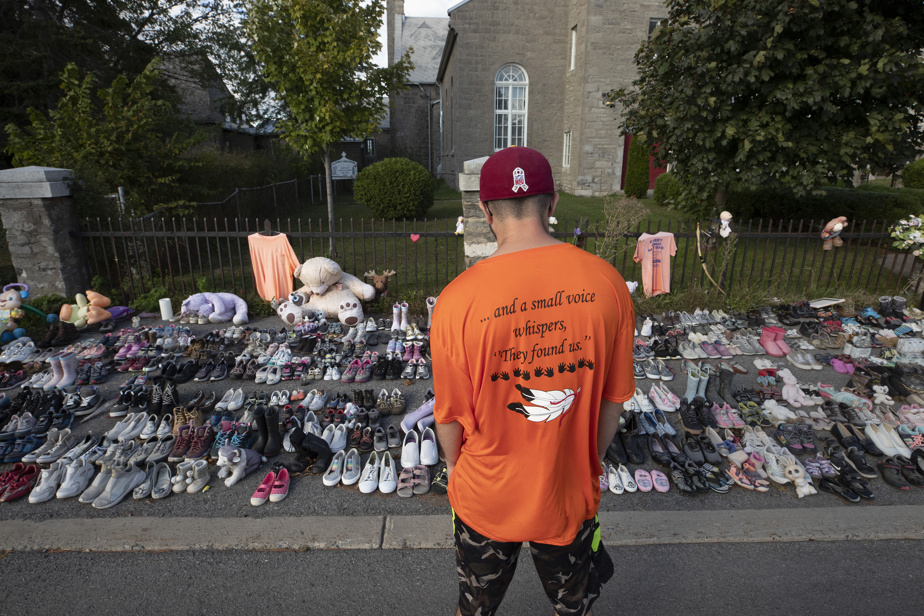Much has been said and written about residential schools for two years. But the facts sometimes remain unknown. Marie-Pierre Bousquet offers an article from the Canadian Encyclopedia “as an introduction”. “Well done,” she said. There are the right bases, the dates, the explanations. In particular, there is a historical summary, testimonies and a description of daily life in the boarding schools, which were for the most part religious schools. Some also offered a fairly good quality education, to the point where some Aboriginal parents wanted to send their children there. “School, as such, is not bad, on the contrary, it is even a human right, specifies the professor. The problem is when you make it a colonial tool. What the residential school system, created after 1880 by Ottawa, was. At its peak, this network had 80 schools in 1930. Torn away from their families, the children were cut off from their culture, their language and lived in often inhuman conditions. The government’s goal was to “kill the Indian in the child”, and the residential schools were only one means of achieving this. “It’s a terrible violence to be despised like this,” notes Marie-Pierre Bousquet.
Over 100,000 Indigenous children went through residential schools. Among them, many have experienced abominable dramas. Rapes, beatings, deprivations. Others have escaped the worst tortures, but the “ordinary violence of the system”, that which uproots and dehumanizes, has affected them all. In a short documentary, the Indigenous-run First Nations of Quebec and Labrador Health and Social Services Commission gives voice to “ordinary” residential school survivors. “This film does not play in misery, emphasizes Marie-Pierre Bousquet. This is pretty raw testimony. I find it important to show real people, what they have become, how they continue to carry their past. “Among the former residents, some also find it difficult to pose as victims, believing that they have been treated less badly. However, they often burst into tears when they immerse themselves in their memories, testifies the anthropologist who has met dozens of them: “A kid does not have the keys to understanding and it is sometimes by hearing others that a person finally realizes what happened to him. And that she can begin her healing. A rare film of its kind in French, adds Ms. Bousquet.
Hosted by Innu poet Marie-Andrée Gill, the podcast Let us tell: the crooked story, co-produced by Terre Innu and Radio-Canada, focuses in 11 episodes on the impact of certain terms on the lives of Indigenous. It is an exercise in decolonization one word at a time. “I think it’s a good idea,” said Marie-Pierre Bousquet. Decolonization is not about self-flagellating, it is rather about understanding the point of view of the other. And wondering how to right an injustice. Among the words discussed are “reservation”, “Pocahontas”, “bannock”… and “school”, which refers to residential schools, but also to current educational institutions. “These institutions have left their mark, have broken the transmission of knowledge, and you don’t necessarily realize what it means to study when you’re indigenous,” explains the researcher. The question arises: what is the place for traditional knowledge at school, at university? The question of the language of instruction is of concern to many Aboriginal organizations these days. It’s not always comfortable to accept that there are a lot of perspectives that we don’t know, admits Ms. Bousquet, but “you have to keep an open mind, you never stop learning”.
Released in 2017, the movie Indian Horse, which can be seen on Netflix, was a great success in English Canada. But it had little echo in Quebec. The series Pour toi Flora, broadcast by Radio-Canada in 2022, came to fill a need, believes Marie-Pierre Bousquet, that of telling the story of the residential schools, from the point of view of the Aboriginals, to a large French-speaking audience. The show also shatters the myth that associates this historical reality only with the western provinces. Written and directed by Sonia Bonspille Boileau, the series offered on Tou.tv “shows that it happened here”, underlines the anthropologist. Pour toi Flora reminds us in passing that prejudice against Aboriginal peoples was common in Quebec until recently. Its dissemination also participates in the evolution of public perceptions, a bit like the death of Joyce Echaquan, at the Joliette hospital in 2020. People realize the harm done to Aboriginal people. “It’s huge,” said Ms. Bousquet. I have seen the difference this recognition makes. In one community, I know people who have stopped drinking thanks to this change in outlook. This awareness also promotes dialogue, notes Ms. Bousquet, one more “small step” towards reconciliation.

